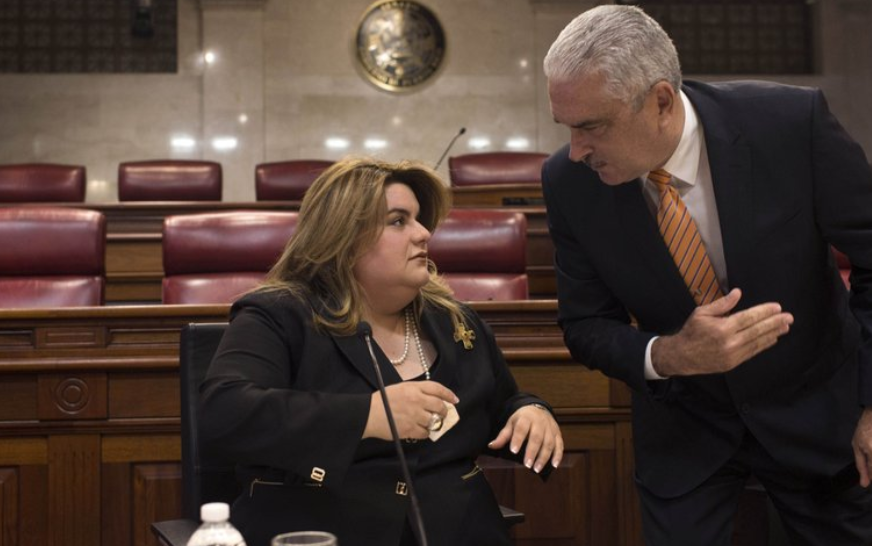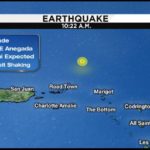SAN JUAN — A day after Puerto Rico got its third governor in less than a week following angry street protests, top officials from new leader Wanda Vázquez’s own party talked openly Thursday about their desire to see a fourth take over the position.
Senate President Thomas Rivera Schatz, who played a key role in the successful court challenge to the swearing-in of Pedro Pierluisi as governor after Gov. Ricardo Rosselló resigned, publicly backed Jenniffer González — Puerto Rico’s non-voting representative in Congress — to be secretary of state, which would put her first in line to become governor if the office should be vacated again.
“If she’s good over there, she would be even better here,” Schatz said after he emerged from a more than four-hour meeting with 66 party members, including senators and mayors.
He said González had everyone’s support, but he added that he would not ask Vázquez to step down.
“We’re not … planning a war here against anyone,” Schatz said.
Schatz, González and the president of the House of Representatives met with Vázquez privately Thursday night at the new governor’s request. “I’m not going to lobby for anything or negotiate anything,” Schatz said before the meeting, and the participants did not comment after the session.
Other members of his pro-statehood New Progressive Party were more outspoken, including Rep. José Meléndez, who said that González was a consensus person and that any change in the governorship should happen quickly.
“The key to breaking the bottleneck lies with Wanda Vázquez,” Meléndez said.
For González to become governor, she would have to be nominated to the open secretary of state position and confirmed by both the House and Senate, both of which are controlled by Schatz’s party. Then Vázquez would have to resign, though the new governor said she did not intend to step down despite previous comments that she didn’t want the job.
González said the presidents of the House and Senate called her last weekend asking if she was available to become secretary of state as a candidate of consensus, and she agreed if it would help restore credibility and stability to Puerto Rico.
“It’s time that people and not politicians become the priority,” she said.
She said she was not seeking Vázquez’s position, but added: “If I got that privilege, I would be a great governor … My experience has proven results.”
She said she would change all Cabinet officials and scrutinize all contracts if she became governor.
González, who is chairwoman of the Republican Party of Puerto Rico, warned that the U.S. government has doubts about how the island is handling federal funds: “The specter of corruption has called into question access to those funds. … They don’t trust Puerto Rico’s institutions or its officials.”
Puerto Rico’s Supreme Court ruled Wednesday that Pierluisi had been placed in office unconstitutionally, resulting in Vázquez, the justice secretary, being sworn in as governor the same evening.
Amid the instability, people on the economically struggling territory of 3.2 million are bracing for more turmoil. The political establishment was knocked off balance by huge street protests spawned by anger over corruption, mismanagement of funds and a leaked obscenity-laced chat in which Rosselló and several top aides disparaged women, gay people and victims of Hurricane Maria, among others.
On July 10, Rosselló’s former education secretary, former Health Insurance Administration chief and three others were arrested on charges of steering federal money to unqualified, politically connected contractors. Islanders are also angry over the territory’s protracted economic woes and slow recovery from 2017’s devastating Hurricane Maria.
Vázquez sought to calm the anger in a televised statement late Wednesday, saying she shares the pain of recent weeks and vowing to bring unity and stability.
“We have all felt the anxiety provoked by the instability and uncertainty,” Vázquez said. “Faced with this enormous challenge and with God ahead, I take a step forward with no interest other than serving the people as I have done my whole life.”
Vázquez has worked in government for more than 30 years and is the second woman to be governor. She would serve out the remainder of Rosselló’s term until elections in November 2020 — unless she doesn’t.
At least some involved in the anti-Rosselló protests are calling for her ouster, too, seeing her as a continuation of the previous administration. However, there were no protests Thursday.
Critics say Vázquez was not aggressive enough as justice secretary in pursuing corruption investigations involving members of her New Progressive Party and that she did not prioritize gender violence cases. She’s also been accused of ignoring investigations into alleged mismanagement of hurricane aid, and of possible ethics violations.
Appointed justice secretary in January 2017, Vázquez previously worked as a district attorney for two decades at Puerto Rico’s Justice Department, handling domestic and sexual abuse cases. In 2010, she was appointed director of the Office for Women’s Rights.
In her televised statement Wednesday night, Vázquez said she would work for all Puerto Ricans.
“History has brought me here without any political aspirations,” she said. “I recognize that I was not chosen by the people for this position. … But I came from those same people. I am a product of public schools. … I know what it is to come from nothing. I know what hard work is.”
–AP



